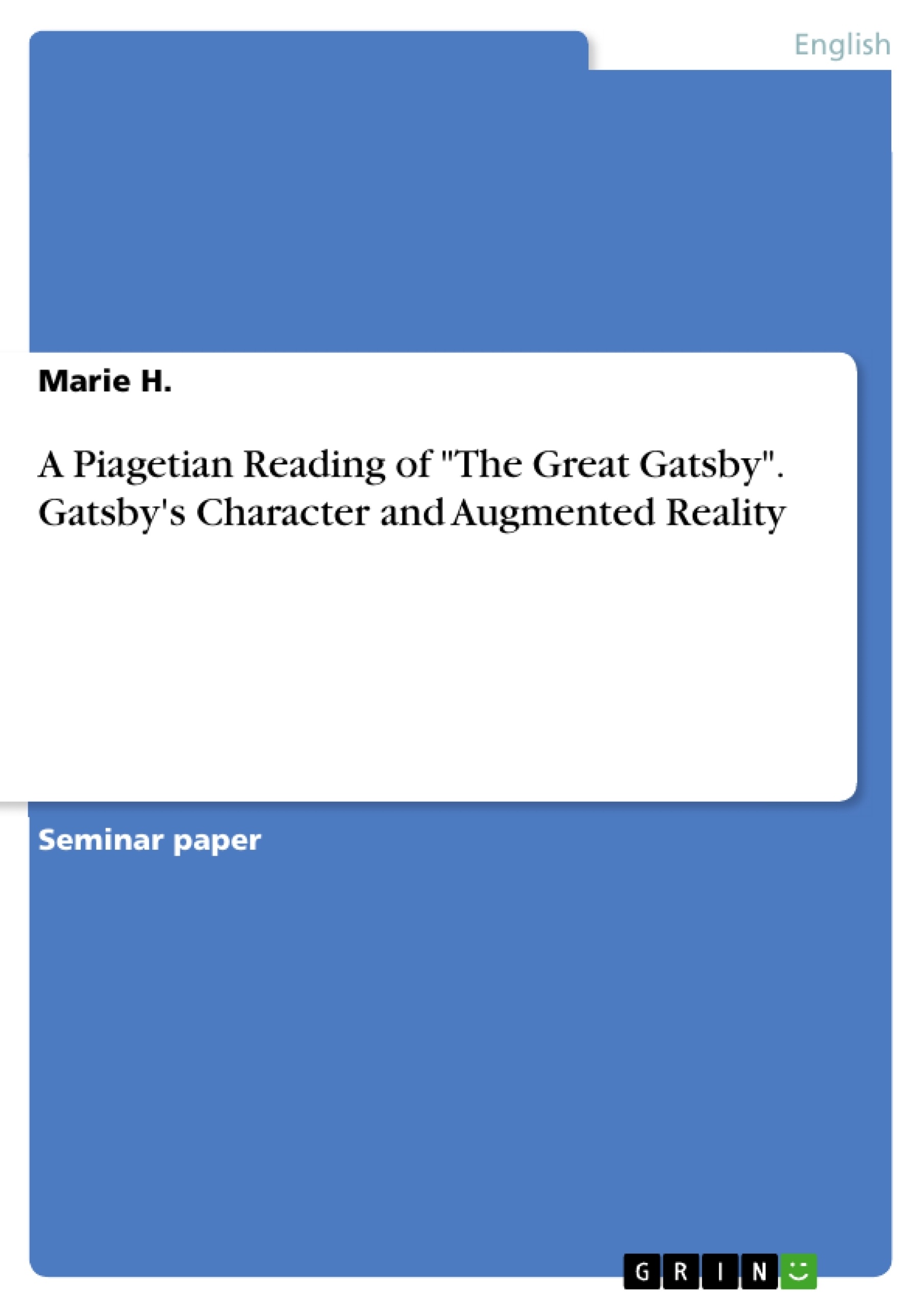The paper at hand will focus especially on Piagets second development stage: the preoperational stage, which covers children around the age of three. Subsequently, the character of Jay Gatsby will be analyzed. Does Gatsby act like a three year old boy, and in how far does this affect his reality?
One question, answered in the conclusion is, if it is possible to analyze Gatsby only considering his egocentrism, and is Piaget is the right theorist to use as a base. In how far can Gatsby be reduced to only one of his attributes?
The most important literature that will be used is the novel The Great Gatsby by Fitz-gerald, as well as three publications written by Piaget: Meine Theorie der Geistigen Entwicklung (eng. My Theory of Mental Development), Possibility and Necessity Vol. 1: the Role of Possibility in Cognitive Development, and Theorien und Methoden der Modernen Erziehung.(eng. Theories and Methods of Modern Education). Those three publications are used, because they are primary literature, as well as relevant to the topic, since they cover almost everything needed for this term paper.
This literature and such more will first give a definition of what the preoperational stage includes, especially focusing on the egocentrism, which will then build the base for the character analysis.
By analyzing Gatsby’s character I want to ascertain his obvious egocentrism.. All in all I believe, that Piaget is a start to analyze Gatsby’s psyche. He is not the usual theorist used for character analysis, since he focused his research on children. Yet, I believe Piaget is the right choice for this topic. I chose him as the foundation of the paper, to point out Gatsby’s inner child.
Inhaltsverzeichnis (Table of Contents)
- Introduction.
- Piaget's Model of Cognitive Development Stages
- An Introduction to the Theory
- The Preoperational Stage
- Jay Gatsby's Egocentrism
- Conclusion
Zielsetzung und Themenschwerpunkte (Objectives and Key Themes)
This paper aims to analyze the character of Jay Gatsby from F. Scott Fitzgerald's "The Great Gatsby" through the lens of Jean Piaget's theory of cognitive development. It will focus specifically on the preoperational stage of development, exploring Gatsby's actions and motivations within the framework of egocentrism. The paper will investigate whether Gatsby exhibits characteristics of this stage, and how this might affect his perception of reality and his interactions with others.
- Piaget's theory of cognitive development stages
- The preoperational stage and its characteristics, particularly egocentrism
- Analysis of Jay Gatsby's character in "The Great Gatsby" through the lens of Piaget's theory
- Exploring the influence of Gatsby's egocentrism on his actions and relationships
- Examining the applicability of Piaget's theory to adult characters and the limitations of solely focusing on egocentrism
Zusammenfassung der Kapitel (Chapter Summaries)
- Introduction: Provides an overview of the paper's focus and outlines the key themes. The chapter introduces the concept of egocentrism in relation to the character of Jay Gatsby and the theoretical framework of Piaget's cognitive development stages.
- Piaget's Model of Cognitive Development Stages: This chapter presents an overview of Piaget's theory, highlighting the stages of cognitive development and emphasizing the importance of the preoperational stage, particularly the concept of egocentrism. It also introduces the main sources used for the analysis.
- An Introduction to the Theory: This subchapter provides a general explanation of Piaget's stages of cognitive development, outlining the sensorimotor, preoperational, and concrete/formal operational stages. It details the characteristics of each stage and the progression of cognitive development within each stage. The chapter focuses on the preoperational stage, specifically the development of symbolic representation and its role in cognitive growth.
- The Preoperational Stage: This chapter focuses on the preoperational stage of cognitive development and delves into the concept of egocentrism. It explains how children in this stage develop symbolic representation and their limitations in understanding perspectives other than their own. The chapter explores the concept of egocentrism further by discussing related phenomena such as animism, finalism, and artificialism.
Schlüsselwörter (Keywords)
The main keywords of the paper are: Piaget's theory, cognitive development, preoperational stage, egocentrism, Jay Gatsby, "The Great Gatsby", F. Scott Fitzgerald, augmented reality, symbolic representation, animism, finalism, artificialism.
Frequently Asked Questions
How does Piaget's theory apply to "The Great Gatsby"?
The paper uses Piaget's preoperational stage to analyze Jay Gatsby's psyche, suggesting that he exhibits the egocentrism typically found in three-year-old children.
What is "egocentrism" in the context of Jay Gatsby?
In Piagetian terms, it refers to the inability to distinguish between one's own perspective and that of others. Gatsby's obsession with Daisy is analyzed as an egocentric inability to accept reality.
Why focus on the "preoperational stage"?
This stage is characterized by symbolic representation but lacks logical mental operations. The author argues this framework helps explain Gatsby's "inner child" and his distorted perception of reality.
What are animism, finalism, and artificialism in this study?
These are phenomena of the preoperational stage where children attribute life to objects or believe everything is made for a purpose, which the paper relates to Gatsby's worldview.
Is Piaget a common theorist for adult character analysis?
No, Piaget focused on child development, but the author argues he is the right choice to highlight the developmental arrests in Gatsby's personality.
What primary literature is used for this analysis?
The analysis is based on F. Scott Fitzgerald's novel "The Great Gatsby" and several primary works by Jean Piaget on cognitive development and education.
- Quote paper
- Marie H. (Author), 2014, A Piagetian Reading of "The Great Gatsby". Gatsby's Character and Augmented Reality, Munich, GRIN Verlag, https://www.grin.com/document/282245



